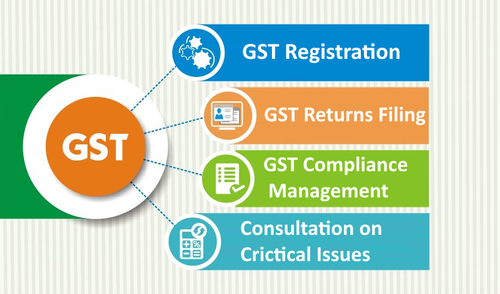Step-by-Step Refine for Singapore GST Registration Explained
Step-by-Step Refine for Singapore GST Registration Explained
Blog Article
Maximizing Tax Obligation Performance: Expert Tips on Navigating the GST Registration Puzzle for Small Companies
Browsing the elaborate landscape of Product and Solutions Tax Obligation (GST) enrollment can be a labyrinthine task for small companies aiming to optimize their tax effectiveness. Understanding the eligibility criteria, careful documentation needs, critical timing factors to consider, and proficient registration process tips can significantly influence a business's financial standing. Compliance with GST guidelines is paramount, and adhering to finest methods can improve procedures and protect against possible risks. In this discussion, we will discover skilled insights and actionable recommendations that can empower local business to navigate the GST registration maze properly and maximize their tax performance.
Qualification Standards
Qualification demands for Small company GST Registration include specific requirements that services have to satisfy to follow tax laws. To get GST registration, a service must have an annual turnover surpassing the threshold set by the tax authorities, which varies by nation. Additionally, organizations associated with inter-state supply of products or services, or those marketing products online, might be needed to sign up for GST, irrespective of their turn over. It is necessary for businesses to precisely establish their eligibility based upon these turnover thresholds to avoid charges for non-compliance. Singapore GST Registration.

Documentation Needs
To successfully complete the process of GST registration, small services need to ensure they have all required documentation in order. The needed documentation generally includes evidence of service registration or address, identification and consolidation proofs of business owner, pictures, savings account information, and proof of the major area of organization. In addition, companies require to give details of their company tasks, including the goods or services supplied. It is crucial to make certain that all papers are exact, up to day, and in the defined format to avoid hold-ups or beings rejected during the registration process.
Aside from the required documents, organizations might additionally be required to submit extra info based upon their particular situations. This can include files connected to partnerships, the consent of signatures, or any various other pertinent arrangements. Keeping all required paperwork arranged and readily easily accessible can improve the enrollment process and help companies abide by the needs effectively - Singapore GST Registration. Failing to offer the needed my blog documents may lead to delays best site and even being rejected of the GST enrollment application. Precise attention to detail and adherence to the documents standards are essential for a successful GST enrollment process for small businesses.
Timing Factors To Consider
Thinking about the important documents requirements have actually been thoroughly dealt with, the next crucial facet for local business beginning on the GST registration process is the strategic management of timing considerations. Timing plays an essential role in GST registration, affecting not only compliance but also financial aspects of the organization. Local business need to meticulously prepare the timing of their GST enrollment to make best use of advantages and decrease prospective dangers.

Additionally, organizations ought to straighten the timing of their GST registration with their operational readiness. Appropriate prep work, such as upgrading accountancy systems and training staff, is vital to effortlessly integrate GST needs right into daily operations. By strategically handling timing factors to More Bonuses consider, local business can navigate the GST registration procedure effectively and maximize their tax effectiveness.
Registration Process Tips
Successfully browsing the GST enrollment procedure calls for local business to carry out calculated and positive enrollment procedure pointers. One vital pointer is to make sure all needed files are readily offered prior to beginning the enrollment process. This includes service registration documents, proof of address, financial institution statements, and identification proofs of business proprietors. Confirming the precision of the details given is just as crucial to stop hold-ups or denials.
Furthermore, understanding the limits and requirements for GST enrollment based upon the specific state or region where business runs is essential. Some states have different turnover thresholds that set off necessary registration, so being educated about these limits can help companies prepare ahead.
An additional beneficial tip is to consider seeking specialist aid from accounting professionals or tax specialists that specialize in GST enrollment. Their know-how can enhance the process, reduce mistakes, and make sure compliance with all policies.
Conformity Ideal Practices
Little organizations should prioritize conformity to avoid penalties and keep an excellent standing with tax authorities. Tiny organization owners must frequently review federal government guidelines and look for professional recommendations if required to ensure they are fulfilling all requirements. By incorporating these conformity best practices right into their operations, small services can navigate the complexities of GST enrollment with self-confidence and effectiveness.
Conclusion
In final thought, small companies can navigate the GST registration puzzle by guaranteeing they satisfy qualification standards, gather needed paperwork, think about timing ramifications, adhere to registration process suggestions, and stick to conformity best techniques. By making best use of tax obligation effectiveness with proper GST enrollment, businesses can improve their financial management and operations.
Browsing the detailed landscape of Goods and Services Tax (GST) registration can be a labyrinthine task for little services aiming to maximize their tax effectiveness.Qualification needs for Small Service GST Registration incorporate particular requirements that companies need to fulfill to abide with tax guidelines. The required documents generally includes evidence of service registration or incorporation, identification and address evidence of the service proprietor, photographs, financial institution account details, and proof of the major location of business. In addition, businesses need to provide details of their company activities, consisting of the items or services supplied.Efficiently browsing the GST enrollment procedure calls for small organizations to apply tactical and positive enrollment procedure ideas.
Report this page